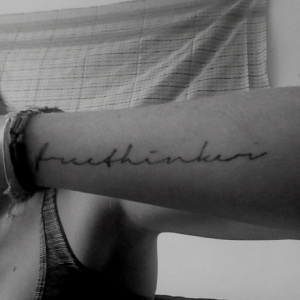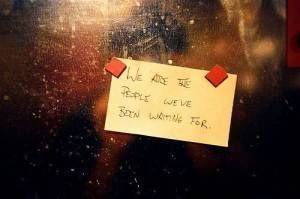Jim Palmer's Blog, page 36
March 14, 2014
Human beings are not born sinners
“Contrary to popular religious belief, sin is not a human disease or condition that is repulsive to God. Humans are not “born sinners” and the Bible does not teach this. Sin does not separate you from God. The truth is that your true Self is an extension of the image, likeness and being of God. God’s original proclamation upon human beings was that we are good. Jesus never condemned anyone for being human. He was human himself.
The word “sin” means to fall short or miss the mark. Fall short of what? Miss what mark? Sin is falling short of experiencing the love, peace, freedom, wholeness, and well-being that constitutes our essential nature. Sin is an orientation toward illusion and falsity. It’s missing the mark of our true identity as good and beautiful children of God. We deny the fundamental truth of being one with God, and instead we fashion a False Self based on the erroneous notion of separation from God. Living from that False Self we sow seeds of disharmony in our world.
You are a human expression of the nature and essence of God. God’s being is the source of your being. This has always been the fundamental truth of who you are from the beginning and has never changed. You are whole and complete, good and beautiful. You are free. You are love, peace, power, compassion, awareness, wisdom, and presence. These are not things you gain through effort; it’s who you are and who you always have been. God extends outward in, through, and as you. You are one with God. This was the message and meaning of Jesus.
We fall short of operating within the reality of who we truly are. Instead, we live through a False Self that contradicts our true Self. The only way the idea of being “born into sin” or “born as sinners” is real is that we are born into a notion of ourselves that falls short and misses the mark of who we truly are.”
- Jim Palmer, Notes from (Over) the Edge


March 13, 2014
A call to think for yourself
This is an appeal to be a free and independent thinking person. Many of us got into trouble with religion because we did not do this. We let others do the thinking for us. Many of us learned to externalize authority. We mistrusted ourselves and bought into the dangerous proposition of trusting the “experts.” Since 2005 I have been chronicling my journey of deconstructing my religion, Christianity. Once I started doing my own thinking I was shocked by how many things I was told in virtually all facets of life that didn’t hold weight, and nothing more than a biased opinion by someone who had an agenda or an axe to grind. What we’ve been told by the institutions of religion, government, education, medicine is simply not true, and if you apply due diligence in deconstructing them you will discover this for yourself.
Be a questioner. Start with the most basic and fundamental things you were told to never question, or those things it never occurred to you before to question. Don’t accept anything on the premise that it’s always been that way or because some “expert” says it’s so. It’s important that you don’t stop learning and educating yourself. Project Gutenberg and Internet Archive are two places to access free books.
Project Gutenberg is a volunteer effort to digitize and archive cultural works, and make them free to readers. It was founded in 1971 by Michael S. Hart and is the oldest digital library. Most of the items in its collection are the full texts of public domain books. The project makes them in long-lasting, open formats that can be used on almost any computer. As of March 2014, Project Gutenberg claimed over 45,000 items in its collection. The Internet Archive is a non-profit digital library with the stated mission of “universal access to all knowledge.” It provides permanent storage of and free public access to collections of digitized materials, including websites, music, moving images, and nearly three million public-domain books. As of October 2012, its collection topped 10 petabytes. In addition to its archiving function, the Archive is an activist organization, advocating for a free and open Internet. Right now I am reading books by Noam Chomsky, John Dewey, and Friedrich Nietzsche – all of them free from Project Gutenberg and Internet Archive.
Here’s a few books I’ve read that I’ve found useful:
Deconstruction of Christianity (Church history):
The Rise of Western Christendom
Deconstruction of Social Structures:
Pedagogy of the Oppressed (education)
Bad Samaritans (economics)
Silent Spring (environment)


March 12, 2014
Religion stunted my spiritual and human growth. Now what?
My involvement in Christianity stunted my spiritual and human growth.
It stunted my spiritual growth by leading down a path of falsehoods, which included the false premises of separation from God, and my inherent badness. It falsely taught me that Heaven is the big payoff for people who have correct theology. I also learned that in exchange for my obedience God would “bless me,” which meant more favorable life circumstances. I believed that Jesus taught these things, and I taught them myself as a pastor with a Master of Divinity degree. I can’t really blame anyone but myself. I was complicit in these falsehoods by not doing my own due diligence and not thinking for myself.
My Christianity also shaped how I viewed the world, which didn’t make me a very good human either. If the world is doomed and escaping it to Heaven when we die is the point (which my theology taught me), what motivation is there to really care about the future of the world? If we can divide up humankind into “us: and “them,” we can scapegoat the “them” and wash our hands of the hardships and suffering of our world. My Christianity taught me that the world was too far gone to be transformed by love, and that there was nothing I could do to change this. Instead, God would sort it all out in the end.
I am an underdeveloped human being largely because of my involvement in Christianity. My theology taught me to split up the world into the categories of “sacred” and secular.” The “sacred” category included the Bible, church, worship, a list of sanctioned Christian activities, spiritual disciplines, approved Christian books, etc. “Secular” was just about every shred of knowledge that couldn’t be gained by doing the aforementioned.
Through my own exploration and the deconstruction of my Christianity, I discovered that all the falsehoods and mentalities mentioned above had nothing to do with the life and teaching of Jesus. Suddenly, Jesus was no longer someone I “should be like,” but someone I actually wanted to be like. I authored four books that tell that story, and the process I underwent to be free.
It’s never too late. I feel like I’m only entering the zenith of my life now. Hey, this free and independent thinking stuff is awesome, and is taking me down all kinds of paths I never imagined I’d be on. Don’t settle. Don’t get too absorbed or stuck in your anger toward religion. Move on. Living and being the truth is always going to be a threat to the system. I’m not saying to be silent - we should confront any system (religious, political or cultural) that is separating people from God, themselves, others, the world, and life. But be the alternative. Like Jesus, let your life reveal a different way. Don’t just be against something. Be FOR something. Be a freethinker, explore, push deeper, press further, educate yourself, question, apply critical thinking, be conscious of the ideologies, narratives, views and mentalities that govern your life and this world.
On a side-note, we added a new member to our family. We adopted a greyhound dog (see above picture). Her name is Gin. Greyhound Pets of America in Nashville goes to the racing tracks and gets retired racers. After a period of “fostering” these greyhounds, they are put up for adoption. Gin was an esteemed and successful racer, with many 1st place finishes. However, she injured herself and could not perform as she had before. In many cases, dogs like this are put down at the tracks. These are the dogs that Greyhound Pets of America get to put up for adoption. We love Gin, and are so happy to have her!


March 11, 2014
It’s being divine and human; not one or the other
Jesus said he was “in this world but not of this world.” The important thing is that Jesus was both. On the one hand, you and I must remember that our true Self is born of God, and that the fundamental nature and essence of who we are complete, whole, at peace, undisturbed, and lacking nothing. Our true Self exists outside of space and time and is one with God. That’s the “not of this world”-part. However, some of us aren’t really “in this world.” We are sort of drifting along, biding our time, absorbed in ourselves, and pining away in passivity and indifference. One good way to be “in this world” is to know this world. Look deeper. Press further. Practice independent and free thinking. Don’t settle for the pat answers. Question everything. Educate yourself. Deconstruct the models, systems, narratives, and ideas that govern our lives. Jesus did all these things. This is why he was a threat to the religious and political establishments of his day. Do you see? Jesus was not human at the expense of being divine. Neither was he divine at the expense of being human. Learn from this, and follow this way.


March 9, 2014
We won’t change the world the way we’re doing it
We are stuck.
Jesus said the kingdom of God is here and now. What is this kingdom? Peace, freedom, love, well-being, harmony, and wholeness. This kingdom exists as the underlying, unchanging, and fundamental essence of who you and I are. This kingdom is here and always has been because we are the kingdom. You don’t need to die and go to heaven to embrace the reality of God’s kingdom because it is fully intact and present in every moment. The problem lies in the fact that much of the world around us is not an expression or manifestation of the kingdom of God within us.
How do we solve this?
Pray and ask God to change everything? No
Philosophizing about grandiose schemes for revolutionary social change? No
Relying on the institutions of religion, government, and education to do it for us? No
Joining another personality cult and vicariously living through there efforts? No
Jesus said you can’t pour new wine into old wineskins. The kingdom of God will not be mediated and manifested through the status quo mentalities and structures we have become dependent upon.
What to do?
Fundamental social change requires honest hard work and persistence from all of us in all areas of life to actually create sustainable change. It doesn’t matter if you’re a gardener, a teacher, a mother, an academic, a lawyer, an athlete, a factory worker, tradesmen, tech head, artist – we each have the power and responsibility when it comes to the development and practice of alternatives… to be he change we wish to see in the world.
Of course no one person can change the world single-handedly, but we need to start seeing fundamental system change as being built and actively developed, not as the product of some top-down revolution, but each of us doing our part and self-organizing together. We have the technology and social media tools to do this. Honestly, what else is there to ask God to do???


March 7, 2014
How to transform the world today
PUBLIC SERVICE ANNOUNCEMENT BY JIM PALMER
While people seek to spark revolutions, launch movements, and achieve epic victories for humankind, it appears that there is nothing more significant for the transformation of the world than what you do as a parent today. There is no more important effort than to teach your children to be independent and free thinkers, and to actively support and encourage their spiritual and human formation. This isn’t just one of those nicey-nice feel-good things to be empathetic toward parents. What I’m saying is that it’s not possible to produce true transformation and lasting change in this world apart from this commitment to parenting. There’s no greater contribution than this!


March 6, 2014
Jesus was an agitator. Your turn now!
We must speak and be the truth. We must take our stand against the falsehoods that are sabotaging people’s lives every day. You are not here to be a consumer. You are not here to acquiesce. We are pining away in passivity because we have been lead to believe that we are more or less helpless, and there is nothing we can do to truly change anything. This is a lie that is designed to keep the current order of things in place. Jesus was an agitator because he would not buy the religious, political and cultural narratives that governed people’s lives in his day. It’s your turn now!


15 teachings of Jesus that lead to freedom that you won’t hear in church
15 Things Jesus DID Say:
“There’s only one litmus test to authenticate if someone gets what I’m about – love.”
“The kingdom of God is here and now, which means it’s not somewhere else and later.”
“If you’ve reached perfection on your journey, feel free to judge others. Otherwise, be quiet.”
“My peace is not as this world gives. Your strategy to control circumstances in order to be happy won’t work… ever.”
“You religious people have your nose buried in the Bible, feeling all smug about your spiritual maturity. But you wouldn’t know my truth if it knocked you in the head.”
“There is no mountain, sacred place or church building where God expects to be worshiped. True worship is a way of seeing – it’s spotting and honoring the divine in all things.”
“You think you are doing well because you have not been hauled off to prison for murder, but your harsh and critical spirit is no different.”
“Embracing my truth will make you a heretic in most people’s minds and you will be persecuted. No worries; you’re on the right track in my kingdom.”
“God and I are one, you are included.”
“I have to die. Otherwise, you’re going to create a religion around my human personhood and personality, rather than embrace and give expression to my spirit and truth.”
“Don’t say you love God and then hate people. Those two things can’t be true at the same time.”
“You and God are not separated and never have been. You are connected to God like a branch to a vine – the essence and nature of God is the sap running through your veins.”
“You can’t reduce my way to a book. The same spirit that filled and led me fills and leads you. Follow that spirit.”
“You think your humanity is an affront to God. If this were true how could I be one with God?”
“You look into the sky to find some God that sits on a throne. You want to see God? You’re looking at him. Now, see that same God as yourself.”
- Jim Palmer


March 5, 2014
How free do you want to be?
I’ve been thinking a lot about liberty. Liberty is sometimes defined as, “the quality individuals have to control their own actions.” Various concepts of liberty articulate the relationship of individuals to society in different ways.
Classical liberal concepts of liberty typically consist of freedoms of individuals from outside compulsion or coercion. This conception of liberty suggests that people should, must, and ought to behave according to their own free will, and take responsibility for their actions. In contrast, social liberal conceptions of liberty place an emphasis upon social structure and agency and is therefore directed toward ensuring egalitarianism.
The discussion of liberty runs into two core ideas – freedom FROM something (freedom from tyranny, coercion, arbitrary exercise of authority), and freedom TO something (the freedom to do as one desires without restraint). People like John Stuart Mill jumped in and advocated the “harm principle” which states “that no one should be forcibly prevented from acting in any way he chooses provided his acts are not invasive of the free acts of others.” Utilitarianism was born out of this idea and posits the idea that the proper course of action is the one that maximizes utility, usually defined as maximizing happiness and reducing suffering.
Once we find true liberation inside ourselves we go out into the world and we give expression to this in all sorts of different ways. I’ve been wondering a lot about what liberty and liberation would look like on all levels of human existence.
(Graffiti pic by Banksy)


Wisdom is not mental, and compassion is not emotional
In the West, we’re taught to think of “wisdom” as something that is primarily intellectual and “compassion” as something that is primarily emotional.
Think of wisdom as consciousness, discernment, or insight. It’s recognizing the true nature of reality, and seeing things as they really are, and not just how they appear.
Compassion is an aspiration, a state of mind, wanting others to be free from suffering. It’s not passive – it’s not empathy alone – but rather it actively seeks to free others from suffering. It seeks to only do that which aids the liberation of all beings. Genuine compassion must have both wisdom and lovingkindness. That is to say, one must understand the nature of suffering from which we wish to free others (this is wisdom), and one must experience deep intimacy and empathy with others (this is lovingkindness).
The transformation of the world cannot happen apart from wisdom and compassion. Take both of these into your life today, and you will be agent of true change and at peace yourself.















